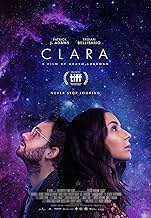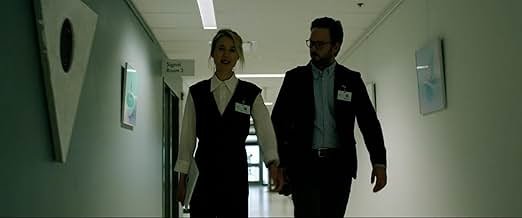IMDb-BEWERTUNG
6,7/10
6151
IHRE BEWERTUNG
Ein besessener Astronom und ein neugieriger Künstler bilden eine unwahrscheinliche Verbindung, die sie zu einer tiefgründigen, wissenschaftlichen Entdeckung führt.Ein besessener Astronom und ein neugieriger Künstler bilden eine unwahrscheinliche Verbindung, die sie zu einer tiefgründigen, wissenschaftlichen Entdeckung führt.Ein besessener Astronom und ein neugieriger Künstler bilden eine unwahrscheinliche Verbindung, die sie zu einer tiefgründigen, wissenschaftlichen Entdeckung führt.
- Auszeichnungen
- 2 Gewinne & 4 Nominierungen insgesamt
Charmaine D. Lau
- Reporter #2
- (as Charmaine Lau)
Nadine Whiteman
- Owner
- (as Nadine Roden)
Empfohlene Bewertungen
I got to see this film at an advance screening ahead of general cineplex release, in a small but dedicated audience who came out on a windy subzero Thursday night. I happily recommend it. The storyline is built on the modern search for Earth-like planets and evidence for life elsewhere in the universe, and the most important thing I want to say is that the science (the astronomy part especially) is real, credible, and gripping. The storyline is clever, the acting is good, and it's engaging from start to finish. We know from the start that a 'discovery' is going to come along, one way or another, and the way it emerges is really nice -- a quite clever twist on what we might have expected. No spoilers, because it's worth seeing for the way it resolves. The director and writer, Akash Sherman, had the basics for the story in place right from the start, but he also had the sense to hire a couple of legitimate science consultants to nail it all down. So the script (mostly) isn't built on "junk science" like most scifi films do (although the use of ideas from "quantum entanglement", which is increasingly popular these days, also has an important role but turns out to be a bit of a stretch).
The way this kind of science is done is also on the money, even if understandably overdramatized just a little. The plot develops just like most real science does: it's both competitive (who's going to "get there" first?? are our heroes going to get scooped by someone else?) and cooperative (many people have to combine their expertise and resources to finish the project). The leading pair are Isaac (Patrick J. Adams) and Clara (Troian Bellisario) but as things develop they get help from Isaac's professional friend Charlie (Ennis Esmer), his former wife and colleague Rebecca (Kristen Hager), and eventually the senior director of TESS, Dr. Rickman (R. H. Thomson). Though Isaac is the leader, all of them quite properly share the credit at the end. The facilities that are part of the proceedings including the Kepler and TESS telescopes, CalTech, U.Toronto, and SETI, are also quite real.
Even in big-budget market-driven Hollywood there are a few good movies based on real astrophysics -- think Contact (1997), Interstellar (2014), or Arrival (2016) for example. They used the right consultants too. The difference between those films and "Clara" is more a matter of tone and scale -- in an indie film it's less necessary to jack up the tension, drama, and big effects and so it can feel more realistic. And it does. The whole process of research, of following a key idea step by step through getting more and better measurements, interpreting them, and moving on to the next stage, are a little oversimplified but they look and feel real, and they don't tax the audience's patience. The actual Discovery Moments aren't big screen-melting "Eureka!!!" deals either; they're lower-key "hmm, that's odd --" kinds of events that are actually just as dramatic but far more real.
Another important thing: scientists like the protagonist, Isaac Bruno, do research because they are flat-out curiosity driven. They're not doing this for glory or riches. They're doing this because that's who they are. This movie shows that curiosity is a fundamental human driver that can actually compete successfully (as we see) against other basic human drivers like food, sleep, sex, shelter -- you name it. Of the big-budget films that follow the same lines I'd place this one closest to Contact.
The cast is just fine and the two young lead actors Adams and Bellisario are quite good. I'd be happy to see them again in other things. Though the planet-hunting is the scaffolding for the storyline, it's really supposed to be a love story with a very human cycle of awkward engagement, joy, regret, and commitment with no fairy-tale ending. Once again, all of this steers away from Hollywood-style Big Moments. Isaac needs to get fully beyond his recent past history of pain and loss, and Clara has to come to terms with being an unwitting (and probably unwilling) conduit for a Message. My thought is that Clara isn't given a last name because of her somewhat mythic place in the plot, but see what you think when you watch it.
The way this kind of science is done is also on the money, even if understandably overdramatized just a little. The plot develops just like most real science does: it's both competitive (who's going to "get there" first?? are our heroes going to get scooped by someone else?) and cooperative (many people have to combine their expertise and resources to finish the project). The leading pair are Isaac (Patrick J. Adams) and Clara (Troian Bellisario) but as things develop they get help from Isaac's professional friend Charlie (Ennis Esmer), his former wife and colleague Rebecca (Kristen Hager), and eventually the senior director of TESS, Dr. Rickman (R. H. Thomson). Though Isaac is the leader, all of them quite properly share the credit at the end. The facilities that are part of the proceedings including the Kepler and TESS telescopes, CalTech, U.Toronto, and SETI, are also quite real.
Even in big-budget market-driven Hollywood there are a few good movies based on real astrophysics -- think Contact (1997), Interstellar (2014), or Arrival (2016) for example. They used the right consultants too. The difference between those films and "Clara" is more a matter of tone and scale -- in an indie film it's less necessary to jack up the tension, drama, and big effects and so it can feel more realistic. And it does. The whole process of research, of following a key idea step by step through getting more and better measurements, interpreting them, and moving on to the next stage, are a little oversimplified but they look and feel real, and they don't tax the audience's patience. The actual Discovery Moments aren't big screen-melting "Eureka!!!" deals either; they're lower-key "hmm, that's odd --" kinds of events that are actually just as dramatic but far more real.
Another important thing: scientists like the protagonist, Isaac Bruno, do research because they are flat-out curiosity driven. They're not doing this for glory or riches. They're doing this because that's who they are. This movie shows that curiosity is a fundamental human driver that can actually compete successfully (as we see) against other basic human drivers like food, sleep, sex, shelter -- you name it. Of the big-budget films that follow the same lines I'd place this one closest to Contact.
The cast is just fine and the two young lead actors Adams and Bellisario are quite good. I'd be happy to see them again in other things. Though the planet-hunting is the scaffolding for the storyline, it's really supposed to be a love story with a very human cycle of awkward engagement, joy, regret, and commitment with no fairy-tale ending. Once again, all of this steers away from Hollywood-style Big Moments. Isaac needs to get fully beyond his recent past history of pain and loss, and Clara has to come to terms with being an unwitting (and probably unwilling) conduit for a Message. My thought is that Clara isn't given a last name because of her somewhat mythic place in the plot, but see what you think when you watch it.
In this film I experienced sadness, wonderment and ultimately hope. It is a love story not only between two people, but also a love story with the cosmos. The film tantalizes with possibilities.
The acting and deliberate pacing were good, as were the visuals. There are no fancy special effects, just good storytelling, combined with solid astronomy.
The only criticism I might have, is that I wanted the story to continue.
The acting and deliberate pacing were good, as were the visuals. There are no fancy special effects, just good storytelling, combined with solid astronomy.
The only criticism I might have, is that I wanted the story to continue.
OK, it's not profound, and you, like me, may well guess the ending before it arrives. But I still shed a tear of loss and joy at the end. I think the sci-fi is incidental to the story of human relationships. If you can overlook the worn and tired cliches, there is something to enjoy...... if you can summon the patience to see it through to the end.
There's a lot of K-Pax here, maybe to the point of plagiarism, but I still enjoyed it.
Is our universe an infinite masterpiece of order and structure? Or is it merely a limitless amalgamation of randomness and chance? These are the questions posed and explored in the new sci-fi drama "Clara".
Writer and Director Akash Sherman has fashioned a most intriguing tale of science, distant space exploration, traumatic loss and unlikely romance. That's a lot of fertile, yet tricky, ground to cover in any story, and Sherman does so most adroitly here. Using equal parts special effects, human drama and deep existential issues, his film presents an embracing and genuinely thought-provoking chronicle of man and his place in the great cosmic unknown surrounding and dwarfing him.
If I have an issue with Sherman's film, it would be this: That what is apparently presented to us as one version of Heaven is, to put it both mildly and quite literally, way out there, man. Yet, as with all of the themes the filmmaker thoughtfully investigates in "Clara", whose to say, or know, that this version of The Afterlife may not be at least in the ballpark of actuality? Certainly not we of mortal man and woman status, and this is for DAMN sure.
Patrick J. Adams (TV's "Suits") and real-life spouse Troian Bellisario (The tube's "Pretty Little Liars") are excellent individually and in tandem as two shattered souls who come together to make a spectacular discovery. Was it the data-driven product of complex analysis and precise calculations? Or could it all have come to pass as simply an accident of luck, happenstance, and, perhaps, even love?
This is the ultimate quandary presented in "Clara". The grand answer may lie embedded in the lyrics of Bob Dylan, whom Sherman prominently features, when the iconic musician suggests it..."is blowin' in the wind."
It's as good a place to start as any.
Writer and Director Akash Sherman has fashioned a most intriguing tale of science, distant space exploration, traumatic loss and unlikely romance. That's a lot of fertile, yet tricky, ground to cover in any story, and Sherman does so most adroitly here. Using equal parts special effects, human drama and deep existential issues, his film presents an embracing and genuinely thought-provoking chronicle of man and his place in the great cosmic unknown surrounding and dwarfing him.
If I have an issue with Sherman's film, it would be this: That what is apparently presented to us as one version of Heaven is, to put it both mildly and quite literally, way out there, man. Yet, as with all of the themes the filmmaker thoughtfully investigates in "Clara", whose to say, or know, that this version of The Afterlife may not be at least in the ballpark of actuality? Certainly not we of mortal man and woman status, and this is for DAMN sure.
Patrick J. Adams (TV's "Suits") and real-life spouse Troian Bellisario (The tube's "Pretty Little Liars") are excellent individually and in tandem as two shattered souls who come together to make a spectacular discovery. Was it the data-driven product of complex analysis and precise calculations? Or could it all have come to pass as simply an accident of luck, happenstance, and, perhaps, even love?
This is the ultimate quandary presented in "Clara". The grand answer may lie embedded in the lyrics of Bob Dylan, whom Sherman prominently features, when the iconic musician suggests it..."is blowin' in the wind."
It's as good a place to start as any.
I'm a Sci-fi fan as well as an Astrophile. The movie got me hooked from the start, with a storyline anyone in Astrophysics knows and can relate to. It might easily be my favorite Sci-fi after The Martian.
WUSSTEST DU SCHON:
- WissenswertesTroian Bellisario (Clara) and Patrick J. Adams (Isaac) are married in real life.
- PatzerAlle Einträge enthalten Spoiler
- Zitate
Clara: It seems too beautiful to just be random.
Dr. Isaac Bruno: It's beautiful because it's random.
- VerbindungenFeatured in CTV News at Six Toronto: Folge vom 10. September 2018 (2018)
Top-Auswahl
Melde dich zum Bewerten an und greife auf die Watchlist für personalisierte Empfehlungen zu.
- How long is Clara?Powered by Alexa
Details
Box Office
- Weltweiter Bruttoertrag
- 50.211 $
- Laufzeit1 Stunde 45 Minuten
- Farbe
- Sound-Mix
- Seitenverhältnis
- 2.35 : 1
Zu dieser Seite beitragen
Bearbeitung vorschlagen oder fehlenden Inhalt hinzufügen

Oberste Lücke
By what name was A Billion Stars - Im Universum ist man nicht allein (2018) officially released in India in English?
Antwort





































